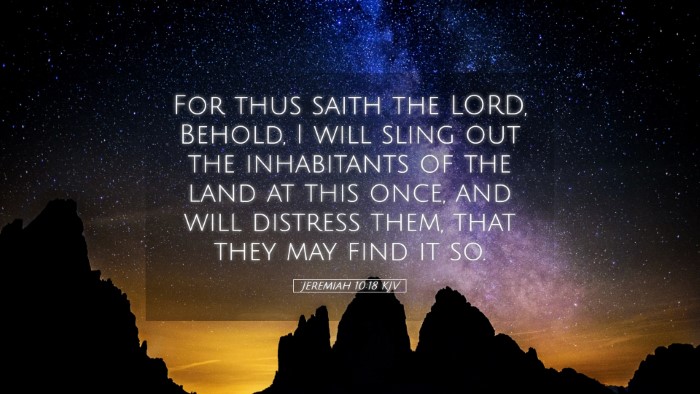Commentary on Jeremiah 10:18
Jeremiah 10:18 (KJV): "For thus saith the LORD, Behold, I will sling out the inhabitants of the land at this once, and will distress them, that they may find it so."
Contextual Analysis
In this verse, Jeremiah speaks to the people of Judah about the impending judgment and exile that will come upon them due to their disobedience to God's commandments. The passage fits within a broader prophetic message challenging the idolatry and faithlessness of the people. Commentators like Matthew Henry elucidate the gravity of God’s judgment, emphasizing that the distress is a divine response to unfaithfulness.
Albert Barnes expands on the background, noting that this verse captures a turning point—God declaring His action against the inhabitants of the land. He suggests that the language of "slinging out" conveys a forceful and thorough removal from their land, indicating that God's judgment would not be mild but severe, serving as a divine correction.
Theological Themes
-
Divine Judgment:
Theology surrounding judgment is prevalent in this verse. It reflects the principle that God will not tolerate sin indefinitely. Adam Clarke expounds upon this by stating that divine judgment often serves a dual purpose: punishment for the wicked and purification for those who remain faithful. The inhabitants are warned to consider the seriousness of their actions and the consequences thereof.
-
God’s Sovereignty:
This verse emphasizes God's sovereignty in human affairs. He is the orchestrator of events and will act decisively against those who rebel against His laws. Commentators agree that the assertion of God’s power in this verse serves as a reminder of His ultimate authority over nations.
-
Distress as a Means of Awakening:
Jeremiah’s words also imply that distress can lead people to repentance. Both Henry and Barnes note that through hardship, the people may recognize their folly and turn back to God, suggesting a redemptive purpose behind the impending suffering.
Literary Devices in Jeremiah 10:18
This verse utilizes vivid imagery characteristic of prophetic literature. The phrase “sling out” suggests not only force but also speed and decisiveness in God's actions. Such imagery evokes a response from the audience, drawing them into the reality of the situation. Clarke comments on the powerful metaphors often used by Jeremiah, illustrating the immediate and impactful nature of the prophetic message.
The contrast between the normalcy of life and the shocking act of being "slung out" serves to highlight the severity of the situation. Here, the literary device acts as a catalyst for deeper reflection on the covenant relationship with God.
Application for Today’s Believer
The themes present in Jeremiah 10:18 resonate with contemporary issues faced by believers. The call to recognize God's authority and the solemnity of His judgment remains pertinent. Pastors and theologians can utilize this verse to speak to the need for repentance and reliance on God amidst societal idolatry.
Reflection Questions:
- In what ways do we see modern idolatry that parallels the actions of Judah?
- How can we encourage our communities to remain vigilant in faithfulness to God?
- What does it mean for us today to experience distress as a means of coming closer to God?
Conclusion
The message of Jeremiah 10:18 serves as a sobering reminder of God’s holiness, His right to judge, and His desire for His people to return to Him. This commentary, drawing from the insights of multiple esteemed theologians, reinforces the timeless truth that God’s actions, even in judgment, hold a potential for restoration and renewal.


